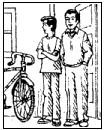
 阅读快车系列答案
阅读快车系列答案科目:初中英语 来源:双色笔记八年级英语(上) 题型:030
Answer the questions. Use the words in parentheses.
1.Q:Could you please clean your room? (Sorry/do the dishes)
A:________________________________________

2.Q:Could I please stay out late? (No/baby-sit your sister)
A:________________________________________
3.Q:Could you please make your bed? (Yes/sure)
A:________________________________________
4.Q:Could I please use your bicycle? (No/need it today)
A:________________________________________
5.Q:Could you please take out the trash? (Sorry/practice the piano)
A:________________________________________
查看答案和解析>>
科目:初中英语 来源:2012-2013学年浙江建德李家镇初级学初一下学期期中考试英语卷(带解析) 题型:单词拼写
根据下列句子及所给单词的首字母,在答题卷上按题号写出各单词的完全形式(每空限填一词)。
【小题1】Can you help me w______ my English?
【小题2】He leaves for school after a q______ breakfast.
【小题3】To be healthy, my parents never forget to e______ in the morning.
【小题4】Alice isn’t w______ TV. She is reading a book.
【小题5】I’m afraid to get l______ because I’m new in the city.
【小题6】Some animals are f______ to people so we like them.
【小题7】Many people have dogs as p______.
【小题8】Mum isn’t at home today. My father and I have to eat o______.
【小题9】Can you play the g______ or the piano?
【小题10】My home is about five k______ away from school.
查看答案和解析>>
科目:初中英语 来源:2015届浙江建德李家镇初级学初一下学期期中考试英语卷(解析版) 题型:单词拼写
根据下列句子及所给单词的首字母,在答题卷上按题号写出各单词的完全形式(每空限填一词)。
1.Can you help me w______ my English?
2.He leaves for school after a q______ breakfast.
3.To be healthy, my parents never forget to e______ in the morning.
4.Alice isn’t w______ TV. She is reading a book.
5.I’m afraid to get l______ because I’m new in the city.
6.Some animals are f______ to people so we like them.
7.Many people have dogs as p______.
8.Mum isn’t at home today. My father and I have to eat o______.
9.Can you play the g______ or the piano?
10.My home is about five k______ away from school.
查看答案和解析>>
科目:初中英语 来源:山东省期中题 题型:填空题
查看答案和解析>>
科目:初中英语 来源:北京模拟题 题型:阅读理解
查看答案和解析>>
湖北省互联网违法和不良信息举报平台 | 网上有害信息举报专区 | 电信诈骗举报专区 | 涉历史虚无主义有害信息举报专区 | 涉企侵权举报专区
违法和不良信息举报电话:027-86699610 举报邮箱:58377363@163.com